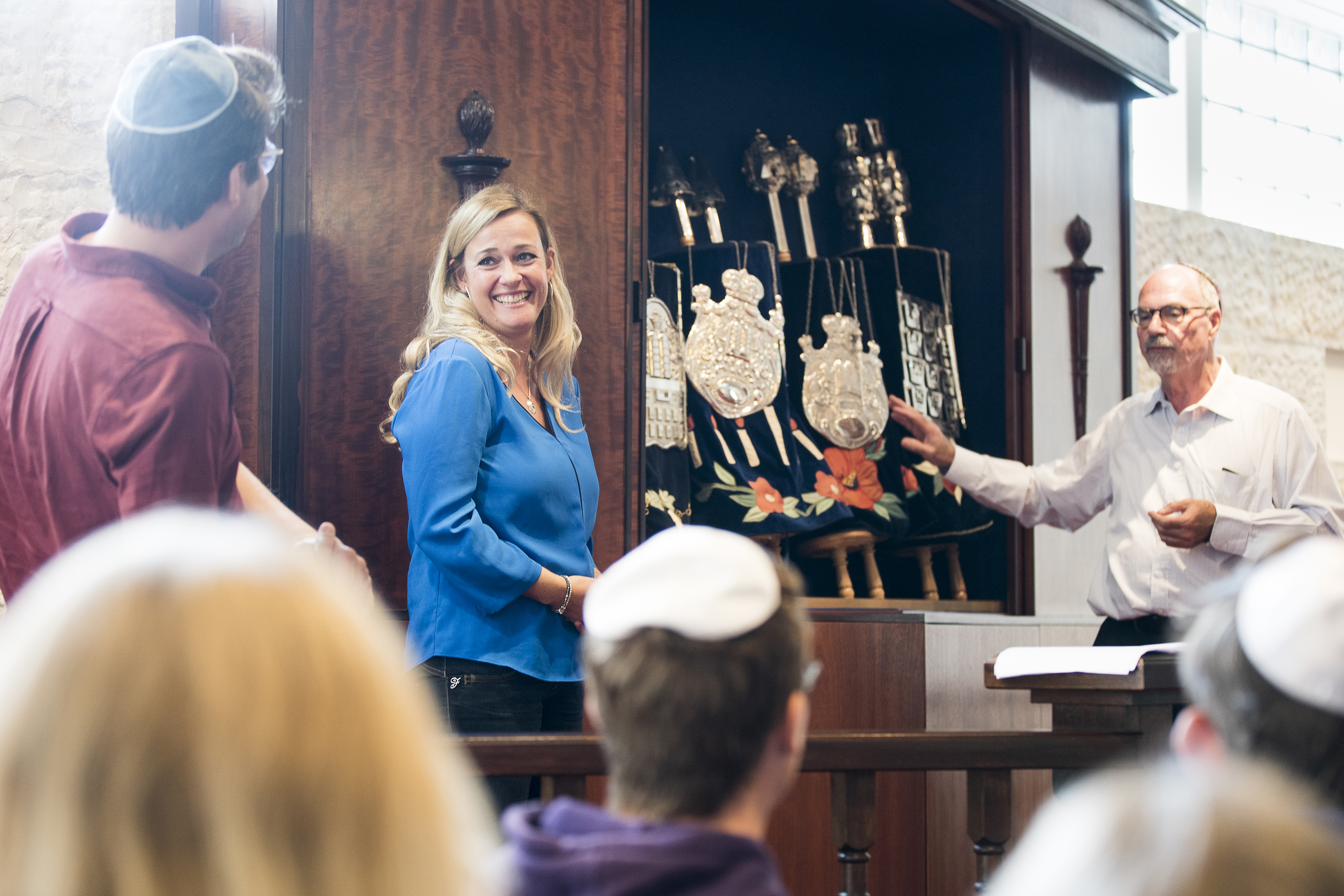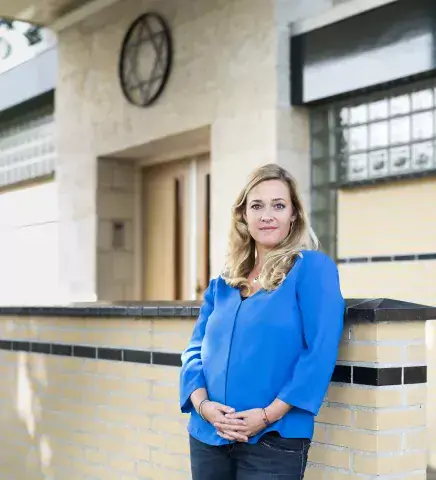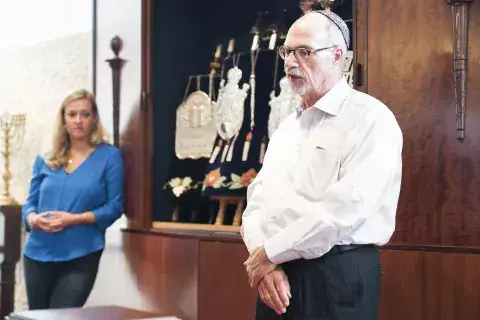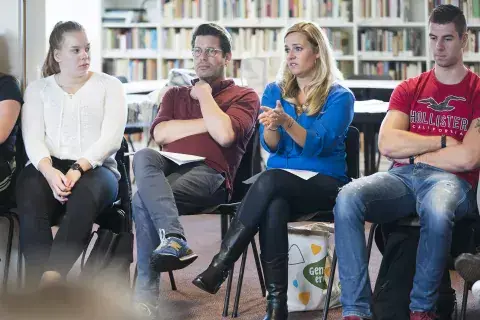
Chantal Suissa-Runne grew up in a Dutch village in the 1980s acutely aware of her minority status.
“We were raised Jewish but were living in this vastly non-Jewish environment,” she said. “I learned early on how to live between two worlds that spoke different languages, which made me sensitive to the needs of other minorities.”
That sensitivity transformed Chantal into an interfaith activist at just 19-years-old, when she moved to a kibbutz in Israel.
“I was this blonde blue-eyed Jewish girl sorting melons with Arab Muslim Bedouins in the hot Negev desert,” she remembers fondly. “I befriended them and decided to dive into their culture.”
When others in the kibbutz objected to her bringing a Bedouin colleague to their dining room, Chantal boycotted the kitchen and ate with her Arab friends on their caravan floor. They appreciated her solidarity and invited Chantal to a Muslim wedding in a remote desert village.
“It was this huge, crazy experience of love and kindness and hospitality. I was so intrigued by these people and inspired to learn more about the world,” she said.

Upon returning to the Netherlands, Chantal joined a Jewish youth organization that hosted interfaith events and exchanges with Muslim and Hindu groups. That led to an Interfaith Alliance job fighting prejudice and discrimination in Dutch classrooms, which later inspired her first large-scale social project Get to Know Your Neighbours.
“In 2011 our synagogue in Amsterdam South experienced some anti-Semitic incidents involving students at a school next door. Rather than building a higher fence, we invited them into the synagogue to get to know us in a relaxed way,” Chantal said of the project’s humble origins.
Since that first encounter, Get to Know Your Neighbours has welcomed 13,000 students and teachers into synagogues in Amsterdam, Utrecht, Enschede, and Rotterdam.
The aim is to combat prejudice and anti-Semitism by facilitating person-to-person dialogue between young people from diverse backgrounds and local Jewish communities. Each 90-minute visit includes a synagogue tour and open discussion about Jewish customs and culture while also giving participants the chance to share their own heritage. These free-flowing conversations address stereotypes head-on, using humour to ease tensions.

“Humour is like oxygen when dealing with this serious stuff,” Chantal said. “It’s better to surface and dissect the anti-Semitic stereotypes we’ve all heard in a safe environment than to let them linger below the waterline. Many students come reluctantly but then are so intrigued they don’t want to leave.”
Chantal remembers one girl who entered the synagogue saying she hated Jews. She went from being the most resistant to the most interested student of her group, apologising at the end for her earlier remarks and vowing to rethink how she envisions Jewish people. Another memorable moment came when a Muslim teacher hugged Chantal at the end of a visit, thanking her for opening the synagogue doors and her students’ minds.
As that teacher and Chantal both knew, local tensions between Jews and Muslims often peak when Israeli-Palestinian conflicts flare up in the Middle East. During one such conflict in 2012, Chantal got the idea for her next big project Mo & Moos, which is familiar shorthand for the prophets Mohammed and Moses.
“I was so fed up with debates and wanted to start something based on real connection, a deep programme built on friendship, trust, and leadership. I wanted to build a new generation of leaders,” Chantal said.

She crafted Mo & Moos as a long-term initiative that would bring together young Jewish and Muslim professionals to jointly fight anti-Semitism and Islamophobia. Just when it came time to recruit participants, the 2014 Israel-Gaza conflict broke out. Other members of the Mayor of Amsterdam’s Muslim-Jewish Dialogue Group worried Mo and Moos would be a liability, but Chantal spotted an opportunity.
“The people who want to cooperate when times are toughest are the keepers,” she said. “For Mo & Moos, it was a blessing in disguise.”
The intensive 18-month programme Chantal developed brought together eight Muslims and eight Jews from a wide range of backgrounds and with diverse relationships to their faiths. These university students, business professionals, journalists, teachers, and representatives of political and civil society groups learned dialogue skills and discussed hot topics including freedom of speech, religious diversity, and Middle East politics.
Beyond the classroom, participants came together for Shabbat dinners and the Muslim call to prayer, sang songs in Hebrew and Arabic, and celebrated each other’s festivals and holidays.
“I knew my mission in the friendship department succeeded when one of the fiercest pro-Palestinian activists who had never talked to a Jew before Mo & Moos and one of the Jewish participants from an Orthodox background called me to say they were going on vacation together,” Chantal said.
The two now serve respectively as board chair and secretary of Mo & Moos, which, due to its success, has been turned into an independent foundation. Today, the organization builds on Chantal’s vision by hosting workshops, school lectures, and events that promote inclusivity and fight discrimination. Recently members teamed up in Jewish-Muslim pairs to welcome Syrian refugees to the Netherlands.
"Everyone is complaining that polarisation and populism are on the rise, which is true, but I built my best project when there were wars and mistrust,” Chantal said. “This is an opportunity. Where there is darkness, you can reveal the most light.”
Chantal Suissa-Runne is one of KAICIID's featured Heroes of Dialogue. To find out more, click here